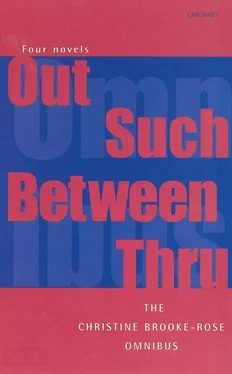Christine Brooke-Rose - The Brooke-Rose Omnibus
Здесь есть возможность читать онлайн «Christine Brooke-Rose - The Brooke-Rose Omnibus» весь текст электронной книги совершенно бесплатно (целиком полную версию без сокращений). В некоторых случаях можно слушать аудио, скачать через торрент в формате fb2 и присутствует краткое содержание. Год выпуска: 2012, ISBN: 2012, Издательство: Carcanet Press Ltd., Жанр: Современная проза, на английском языке. Описание произведения, (предисловие) а так же отзывы посетителей доступны на портале библиотеки ЛибКат.
- Название:The Brooke-Rose Omnibus
- Автор:
- Издательство:Carcanet Press Ltd.
- Жанр:
- Год:2012
- ISBN:9781847775757
- Рейтинг книги:5 / 5. Голосов: 1
-
Избранное:Добавить в избранное
- Отзывы:
-
Ваша оценка:
- 100
- 1
- 2
- 3
- 4
- 5
The Brooke-Rose Omnibus: краткое содержание, описание и аннотация
Предлагаем к чтению аннотацию, описание, краткое содержание или предисловие (зависит от того, что написал сам автор книги «The Brooke-Rose Omnibus»). Если вы не нашли необходимую информацию о книге — напишите в комментариях, мы постараемся отыскать её.
The Brooke-Rose Omnibus — читать онлайн бесплатно полную книгу (весь текст) целиком
Ниже представлен текст книги, разбитый по страницам. Система сохранения места последней прочитанной страницы, позволяет с удобством читать онлайн бесплатно книгу «The Brooke-Rose Omnibus», без необходимости каждый раз заново искать на чём Вы остановились. Поставьте закладку, и сможете в любой момент перейти на страницу, на которой закончили чтение.
Интервал:
Закладка:
Speaks the king’s daughter to the prince disguised as poor younger son or the binary bourgeois lady of the left anxious not to take ten steps back to unpaid mortgages and seeing men through their theses and early publications stereotyping their index? Of course I have a job, I mean I had but I resigned, Maddy made it impossible for me.
Oh, where?
In Porlock.
Where’s that?
Well in England. It’s a new university.
Oh? Revolutionary?
No thank goodness. It’s a language centre.
And what did you teach?
Albanian.
Goodness, is that a subject?
It’s not only a subject it’s a language.
Well I know, I meant
It may be connected with Etruscan, a great civilisation. Virgil was an Etruscan and so was Julius Caesar. And other languages too, Russian and Georgian. And Linguistics.
Linguistics? Oh, good for you.
But I want to switch to comparative literature. I have a friend in Lima in Peru, there’s a new university starting up and they need people, and he says if I just turn up, oh come with me to Lima.
I’ve heard of this place, it sounds interesting and very radical. But then you wouldn’t like it would you. Tell me, how is it that you, so young, are against revolution? It has to happen you know.
Revolution is for adolescents. And I’m not young, I seem young to you because you’re older, though not so much, oh it could work, please, it’s in the family, my mother was older than my father, my brother married an older woman I believe in it I need you I’ve done nothing, I feel old and my life’s a mess, but with you, I know, I just know it will all come right, I feel this tremendous strength, please please don’t turn me down, I want to catch up the lost years, now now, we have so little time my youth is gone.
You who hope to get through hell in a hurry, consulting your watch and removing it. You see I have brought these books. This is a best-seller and sometimes you write like it when the pressure of breast-selling reality forces you to open doors that nevertheless lead into one another through an inexorable typology of embedded digressions and an incompetent heroh competence again with the rapid foisting as usual of this or that candidate whenever there is a vacancy and no quorum left, whose pygmylion desire and wild performative nevertheless generates a text unless the motivation is reversed. Any agent can enter into a relation with any predicate. The notions of subject and object do not correspond to a difference in nature but to a place in the proposition uniting for instance two lovers. Hence there is no need to talk of hero villain seducer traplayer and lawbearer these rules are interchangeable. Sometimes however you vanish into a linguistic edifice you have erected, you or the garlic, in a six-hour nightly timetable which is very exhausting, crumbling your viscerally disorganised resistance to prove what? That the timetable exists the moment it has been uttered as a possibility? That the lover of the moment will be untactfully dropped with scene and summary as is forescene thus unbalancing the cost on the one hand and on the other the mean culpa justifying the felix end in an eternal game of vinciperdi, though the economy of the narrative is seriously impaired and may crash into a middle class crisis? Or that it is more difficult for a phallus-man to enter the I of a woman than for the treasurer of signifiers to enter the paradisco terrestre?
But we must not confuse the levels of discourse YOU ARE HERE and the paradiso terrestre is a paradiso corporel which must last a little longer so that you follow the principle not to follow the principle but remain good lovers or maybe call his bluff and accept I promessi sposi? We love each other now, we have loved each other for six weeks, isn’t that enough?
No. If it’s not just tact and diplomacy you’re trying to use, if you really love me as you say, please don’t give up. Of course there are problems, of course there may be difficult adjustments for both of us, there always are. But I know, I know, deep down, I feel we’ve had too little time. If we can only give ourselves a year, another summer, we’ll never want to leave each other, never. The gods can condemn us to life and death, but they can’t force us to be human in our lives.
Can’t they?
Ripeness is all and ripeness is far beyond calm and wisdom, è un astratto furore.
Stavro that’s beautiful. I’m not sure whether it’s true but it’s beautiful. Thank you. I must however go to Rome alone for three or four days.
What! Why, what for?
To meet my husband.
But, I thought you’d left him.
He wants me back. We’re going to talk it over.
But that’s absurd, how can he, you’re with me now, you must divorce and marry me, oh promise me you’ll ask for a divorce and won’t weaken, oh god, three days! What shall I do?
If you care as much as you say you can wait for me.
Three days! I’ll never get through them. I’m going to lose you, I know it I know it please don’t go who does he think he is after three years!
Not for sale as object of exchange of information.
But every structure presupposes a void, into which it is possible to fall into delirious discourse, the intelligence suspended helplessly as it watches the acting out of its own lunatic trajectory.
For within every idyll there opens out another idyll, as a vast mouth that never names the secret chiasmus in her, in him, the idyll of Armel and Larissa who once upon a spacetime is a poem not a couple, the idyll of Marco, Oscar, Stavro and Marika, Amanda, Maddy and the rest, Armel and Veronica, Veronica and perhaps even Christopher. And within each idyll opens out the idyll of the paradiso terrestre which is no longer Arcadia but the other scene.
Who speaks? The Other Author.
Chi parla?
Hi Lara!
Armel! Hi.
Hi. Are you alone?
Yes of course. Where are you?
Downstairs may I come up?
Ma certo caro.
In many languages from Phaedrus to Freud effortlessly displacing notions with several syndiachrumbilical chords.
You look terrific Armel. So brown and slim. Too slim in fact you’re positively thin.
You know I live on sun and yoghurt. I’ve been on the beach. Waiting for your arrival. What happened to you? I went to the semiotic castle as arranged and you’d gone.
Yes I’m sorry. Fear perhaps. I went off.
So they told me. Professor La Bocca I mean.
He’s nice.
Yes. But he wasn’t very discreet. So Italian. They not only boast of their own conquests they gossip about others.
That’s unlike you Armel why this anti-Italian generalising?
Well. Are you in love?
Allegra ma non troppo.
The happiness sequence?
Busting out of sequence. He’s not Italian anyway he’s Albanian. Perhaps Etruscan. Virgil was an Etruscan.
It’s an Italian name.
Laretino? I guess so I think his mother married an Italian, but Stavro is apparently Albanian. Keeping his t for two his object and his V for victory.
Oh Larissa are you still at it?
Not really. Though it acquires a curious importance when a man proposes insistantly and has nothing to offer but his body and his name. Which is why, I suppose, he offers them around with such tremendous pressure though heaven knows the second is no longer necessary for the purpose of the first. But in order not to seem too eager for just the body as a love-machine one starts thinking, or pretending to think, of the name.
You seem unusually allegra, even agitata, did you say ma non troppo?
Stavro Laretino. Yes of course it’s Italian, from Aretino, a district and a man. Do you know who l’Aretino was? A sort of scabrous precursor of Don Giovanni except that he was a mere writer like Casanova. Well there it is I shall miss my Subject in him, keeping it even if it gets mauled a bit and he will miss his victory and his it in me, keeping them as a small winner. He has ashthma however, sometimes in the middle of it all, and wouldn’t be able to sing the part.
Читать дальшеИнтервал:
Закладка:
Похожие книги на «The Brooke-Rose Omnibus»
Представляем Вашему вниманию похожие книги на «The Brooke-Rose Omnibus» списком для выбора. Мы отобрали схожую по названию и смыслу литературу в надежде предоставить читателям больше вариантов отыскать новые, интересные, ещё непрочитанные произведения.
Обсуждение, отзывы о книге «The Brooke-Rose Omnibus» и просто собственные мнения читателей. Оставьте ваши комментарии, напишите, что Вы думаете о произведении, его смысле или главных героях. Укажите что конкретно понравилось, а что нет, и почему Вы так считаете.












